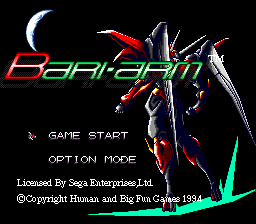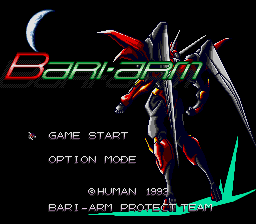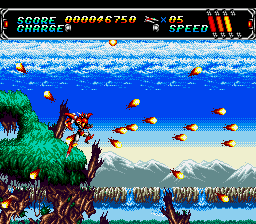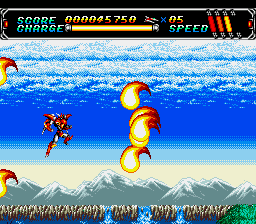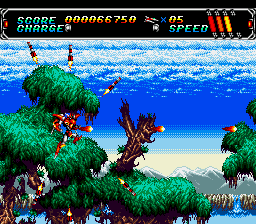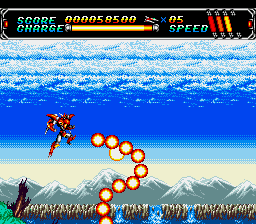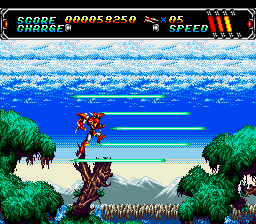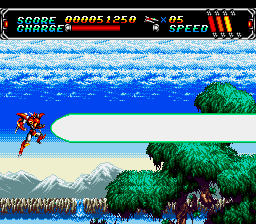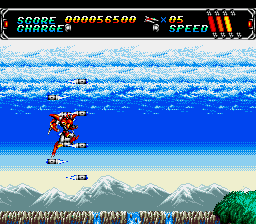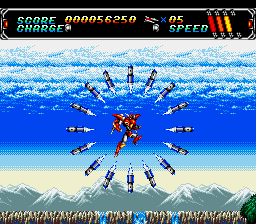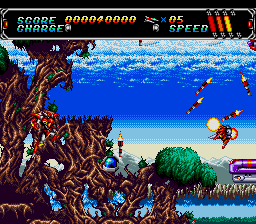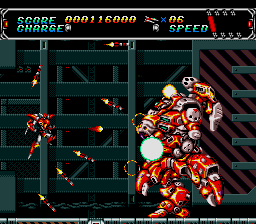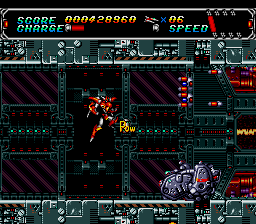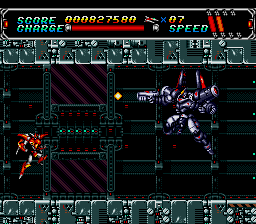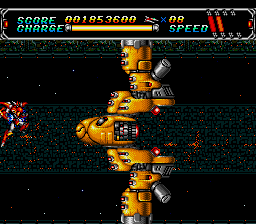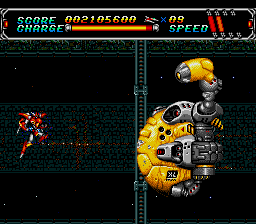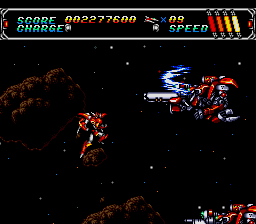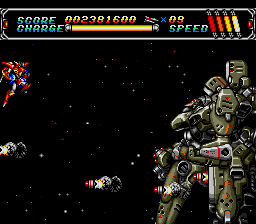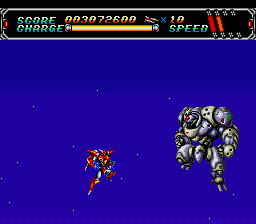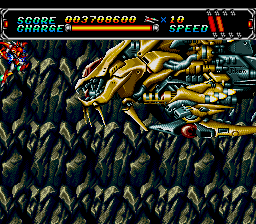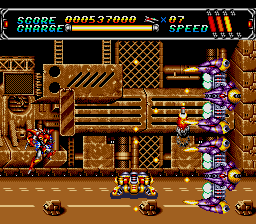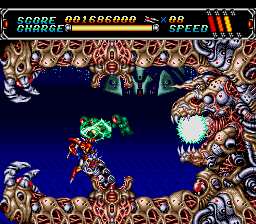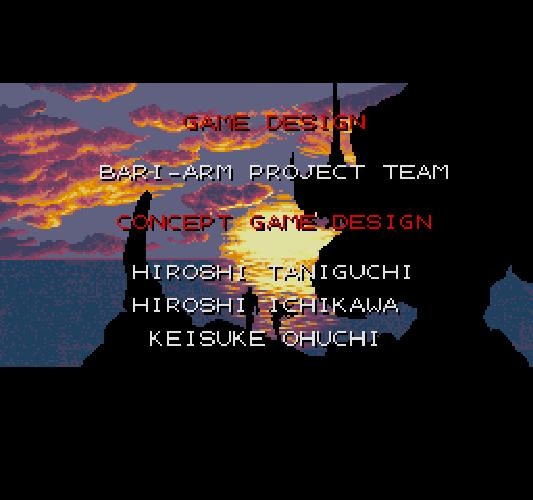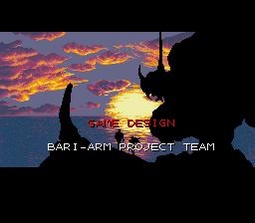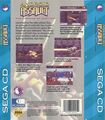Android Assault: The Revenge of Bari-Arm
From Sega Retro
| |||||||||||||||
| Android Assault: The Revenge of Bari-Arm | |||||||||||||||
|---|---|---|---|---|---|---|---|---|---|---|---|---|---|---|---|
| System(s): Sega Mega-CD | |||||||||||||||
| Publisher: Human (Japan), Big Fun Games (US) | |||||||||||||||
| Developer: Human | |||||||||||||||
| Genre: Shooting[1] | |||||||||||||||
| Number of players: 1 | |||||||||||||||
|
Android Assault: The Revenge of Bari-Arm, known in Japan as simply Bari-Arm (バリ・アーム), is a Sega Mega-CD horizontal shoot-'em-up game developed by Human. First published in Japan by Human themselves in July 1993, it was later localized and brought to the United States by Big Fun Games in October 1994.
Contents
Story
Mankind makes advances in space travel and colonization. In the year 2192, however, the colonists near Jupiter are attacked by the independent military nation of Zias, stationed on the Olympus colony of Saturn. Zias uses a symbiotic computer system and several mecha factories powered by a device called the GEO as their primary attack force. Human scientists study the Zias technology, and based on the Zias GEO system, construct a space fighter capable of fighting against the Zias: the Bari-arm (a contraction of the words "barrier armor"), a space ship capable of using multiple weapons and transforming into a giant robot. The Bari-arm must destroy the GEO system before the Zias war machines destroy any further colonies.
Gameplay
The game is a horizontally scrolling shoot-'em-up in which players pilot the Bari-arm, a fighter craft that can transform into a flying mecha. The Bari-arm moves in any direction using the D-Pad. Stages are taller than the viewable area and scroll vertically if the Bari-arm moves to the edge of the screen. The Bari-arm has four speed levels, which the player can cycle through with ![]() . It fires its standard weapon with
. It fires its standard weapon with ![]() or
or ![]() , which can be held down for rapid-fire.
, which can be held down for rapid-fire.
Weapons are collected as icons in the stage. Most weapons can cover both the front and back of the ship. Weapon power has three levels, which can be upgraded by collecting power-ups. At the highest power level, the Bari-arm transforms into its mecha form. Getting hit by enemy fire in the mecha form reverts the Bari-arm to its space ship form. If hit in space ship form, the Bari-arm is destroyed; the last weapon is retained, but the weapon level is lost.
The Bari-arm additionally has a charge weapon, which is automatically charged when the player is not pressing the fire button. The charge weapon unleashes a stronger version of the currently equipped weapon. There are three charge levels, with the third level being the most powerful but requiring the most downtime to attain. This mechanic incentivizes the player against firing constantly, as it is sometimes strategically advantageous to hold for the more powerful charge weapon.
There are four difficulty levels (Easy, Normal, Hard, and Mania). The player can set the starting lives and credits in the options prior to starting a game. Extra lives are awarded at 100,000 and 500,000 points and then every 500,000 points after that.
Weapons
| Thunder Cracker | |
|---|---|
| Orange orb. A spread shot that shoots four streams of fireballs in a cone shape in front of the Bari-arm. Higher levels also shoot two streams of fireballs from behind the Bari-arm. When charged, it unleashes large fireballs in the same pattern rather than streams of smaller fireballs. These fireballs can penetrate barriers. This weapon is initially equipped. | |
| Chase Cannon | |
| Red orb. Fires a flurry of homing missiles; higher levels increase the number of missiles. When charged, it releases a pulse snake that seeks out and attacks enemies until the charge bars are depleted. This weapon, however, cannot pass through barriers. | |
| Burning Wave | |
| Green orb. Shoots long green laser beams that travel from the Bari-arm to the end of the screen. Higher levels add more beams, up to five, heightening the area of effect. When charged, it forms a single thick beam that lasts until the charge bars are emptied. This is the only weapon that cannot fire behind the Bari-arm, but it penetrates barriers in all forms. | |
| Satellite Bombs | |
| Blue orb. Releases missiles and shoots them horizontally in front of the Bari-arm in a loose spread. When charged, it releases missiles in a full circular formation starting from the center of the Bari-arm. |
Items
| Orange Transformer Module | |
|---|---|
| Equips the Thunder Cracker weapon. | |
| Red Transformer Module | |
| Equips the Chase Cannon weapon. | |
| Green Transformer Module | |
| Equips the Burning Wave weapon. | |
| Blue Transformer Module | |
| Equips the Satellite Bombs weapon. | |
| Standard Canister | |
| Upgrades the weapon level, up to 3 levels. The Bari-arm transforms into its mecha form at the highest level. |
Stages
| Ganymede | |
|---|---|
| Gravity Pagoda | |
| Zeus Fleet | |
| Olympus | |
| Moon Base | |
| Blue Wind | |
| Bay Side City | |
History
Legacy
It was long-speculated that artwork and graphics of Bari-Arm, particularly the designs of player and enemy mecha, were created by Japanese illustrator Masami Ōbari. In recent years, however, Ōbari has personally denied involvement in the game's production, and it appears the similarities were instead strongly inspired from the illustrator's general style.[5][6]
Versions
Localised names
| Language | Localised Name | English Translation |
|---|---|---|
| English (US) | Android Assault: The Revenge of Bari-Arm | Android Assault: The Revenge of Bari-Arm |
| Japanese | バリ・アーム | Bari-Arm |
Production credits
- Game Design: Bari-Arm Project Team
- Concept Game Design: Hiroshi Taniguchi, Hiroshi Ishikawa, Keisuke Ohuchi
- Chief Programmer: Jun Hirata
- Program: Tomomi Ohsawa, Kiyobumi Tsukahara, Tetsutarou Hoshino, Hideyuki Kodaira
- Chief Graphic Design: Hiroshi Ishikawa
- Graphic Design: Akira, Nozomu Azuma, Shike Tadao, Edi Otihusay, Junji Ohta, Keisuke Ohuchi
- Visual Animation: Kenichi Abe, Hiroshi Ishikawa, Keisuke Ohuchi
- Music Composed and Arranged by: Nobuhiro Makino
- Key: Nobuhiro Makino
- Drums: Tohru Tanaka
- Bass: Ataru Kindaichi, Masaaki Mizuno
- Guitar: Jirou Takada, Kenichi Ohkusu
- Sax: Seiichirou Seki
- Sound Engineers: Akio Yasuhara (CoCo Studio), Toshiaki Yamaya (CoCo Studio), Tameharu Endou (PALE GREEN Studio)
- Project Ultimo: Masao Watanabe, Kohichi Iizuka
- Voice and Narration: Jason Russell
- Sound Installation and Effects: Hiroshi Taniguchi
- Sound Producer: Hiroya Niwayama
- Composer: Hiroshi Taniguchi
- Guitar: Katunori Kitajima
- Bass: Shaka Yonezawa
- S. Engineer: Konomi Itou
- S. Adviser: Hideo Maeda
- Sub Director: Jun Hirata
- Director and Supervisor: Keisuke Ohuchi
- Special Thanks: Hiroyuki.S, Masahiko.A, Mayumi.S, Hisako.H (MOTHER BASE), Yukiyo.Nakajima (AtoZ NETWORK), Yuuichi Kobayashi, Takeshi Suzuki, Masato Masuda, Kimura Brothers., Takashi Ueno, and my Sweetheart.
- Hirosi Taniguchi / Hiroshi Ichikawa / Keisuke Ohuchi
- Bari-Arm Project Team
- ©Human Corporation 1992 1993
- Licensed by: Sega Enterprises, Ltd.
- ©Copyright Human and Big Fun Games 1994
Magazine articles
- Main article: Android Assault: The Revenge of Bari-Arm/Magazine articles.
Promotional material
Physical scans
| Sega Retro Average | |||||||||||||||||||||||||||||||||||||||||||||||||||||||||||||||||||||||||||||||
|---|---|---|---|---|---|---|---|---|---|---|---|---|---|---|---|---|---|---|---|---|---|---|---|---|---|---|---|---|---|---|---|---|---|---|---|---|---|---|---|---|---|---|---|---|---|---|---|---|---|---|---|---|---|---|---|---|---|---|---|---|---|---|---|---|---|---|---|---|---|---|---|---|---|---|---|---|---|---|---|
|
| 70 | |
|---|---|
| Based on 15 reviews | |
Technical information
External links
- Sega of America webpage: Mega CD
References
- ↑ 1.0 1.1 https://sega.jp/fb/segahard/mcd/soft_licensee.html (Wayback Machine: 2019-06-10 17:56)
- ↑ Beep! MegaDrive, "August 1993" (JP; 1993-07-08), page 13
- ↑ Sonic Times, "Volume 2 Number 9: October 1994" (US; 1994-xx-xx), page 8
- ↑ 4.0 4.1 Game Players, "Vol. 8 No. 1 January 1995" (US; 199x-xx-xx), page 56
- ↑ @g1_bari on Twitter (archive.today)
- ↑ @g1_bari on Twitter (archive.today)
- ↑ File:BariArm MCD JP SSEnding.pdf
- ↑ File:Android Assault MCD credits.pdf
- ↑ Beep! MegaDrive, "August 1993" (JP; 1993-07-08), page 22
- ↑ Dengeki Mega Drive, "August 1993" (JP; 1993-07-08), page 36
- ↑ Electronic Games (1992-1995), "November 1994" (US; 1994-1x-xx), page 148
- ↑ Electronic Gaming Monthly, "December 1994" (US; 1994-xx-xx), page 48
- ↑ Famitsu, "1993-08-06" (JP; 1993-07-23), page 41
- ↑ GameFan, "Volume 1, Issue 10: September 1993" (US; 1993-xx-xx), page 15
- ↑ Game Power, "Novembre 1993" (IT; 1993-1x-xx), page 90
- ↑ GamePro, "December 1994" (US; 1994-xx-xx), page 138
- ↑ Game Informer, "January 1995" (US; 199x-xx-xx), page 42
- ↑ Hippon Super, "August 1993" (JP; 1993-07-03), page 41
- ↑ Joypad, "Septembre 1993" (FR; 1993-0x-xx), page 93
- ↑ Mega, "November 1993" (UK; 1993-10-21), page 59
- ↑ MegaTech, "October 1993" (UK; 1993-09-20), page 72
- ↑ Sega Saturn Magazine, "September 1995" (JP; 1995-08-08), page 85
| Android Assault: The Revenge of Bari-Arm | |
|---|---|
|
Main page | Comparisons | Hidden content | Magazine articles | Reception | Technical information | |
